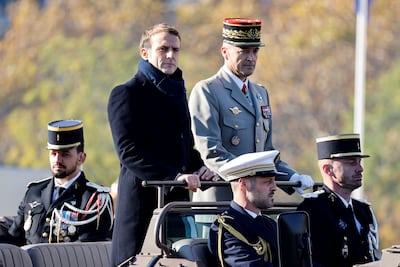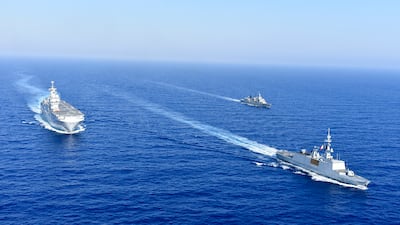France begins two weeks of naval drills in the Mediterranean on Thursday described as a “laboratory of war” to prepare for future conflicts.
About 6,000 troops will take part in the Polaris exercises, working from 20 warships, a submarine, three naval headquarters and a fleet of aircraft.
With help from the UK, US, Italy, Greece and Spain, they will simulate a battle at sea involving the nuclear-powered aircraft carrier Charles de Gaulle.
The aircraft carrier, which last week was involved in a collision with a sailing boat off the French coast, will come under an imaginary attack led by the amphibious helicopter carrier Tonnerre.
Both vessels were recently deployed in the Mediterranean, with Tonnerre holding joint exercises with Greece during maritime tensions with Turkey.
The Greek frigate Adrias is taking part after sailing to the French port of Toulon for the drills, which are being held in the western part of the sea.
France has made a point of speaking up for Greece’s security, having signed a defence agreement with Athens in October.
The pact was welcomed by the Greek government as a security guarantee against Turkey, which has angered Paris with its claims on land, sea and mineral rights in the Mediterranean.
Another frigate, the Auvergne, visited Cyprus on a tour of the Eastern Mediterranean last week that its captain said was a signal of France’s commitment to security in the region.
The Charles de Gaulle staged a show of strength with Britain’s flagship HMS Queen Elizabeth in the sea in June.
The UK’s involvement comes as it tries to salvage the remains of an F-35 combat aircraft out of the Mediterranean after it crashed on Wednesday.
The French navy said the Polaris exercises would push sailors to think on their feet and “invent and test the techniques of tomorrow’s warfare”.
“Polaris is a giant laboratory for the war of tomorrow,” said Admiral Pierre Vandier, the chief of staff of the French navy.
Adm Vandier, a former commander of the Charles de Gaulle, said the aim was to prepare French troops for a “high-intensity war” marked by uncertainty and surprise.
“Fighting a war at sea is about combining the different capacities that we have, including land and air, but also being able to fight simultaneously in the fields of submarines, naval aircraft, space and cyberspace,” he said.
The exercises will enable France to “win the war before the war,” he said.

The drills, which will partly extend to France’s Atlantic coast, will prepare the way for a carrier strike group deployment that begins in February.
They are also designed to strengthen France’s ability to act as part of a military coalition with its allies.
Spain is supplying the frigate Mendez Nunez and the supply ship Cantabria to the exercises, which run until December 3.
The co-operation with the US comes after Paris and Washington sought to calm tensions over a controversial submarine deal with Australia.
The pact infuriated France because it torpedoed an existing deal that Australia had made with Paris to buy submarines.
US President Joe Biden acknowledged last month that the deal was clumsily handled and “not done with a lot of grace”.


